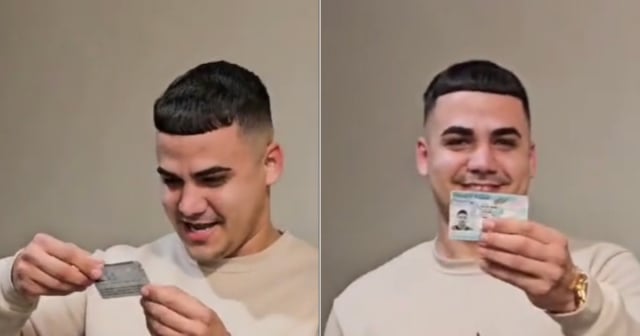A video posted on TikTok by the user Omar Alfonso (@omar.alfonso91) has sparked debates within the Cuban community in the United States.
In the clip, a young Cuban with an I-220A permit directly addresses former President Donald Trump, seeking assistance to regularize his immigration status after several years of living in uncertainty.
"Oh Trump, my son, do something for the I-220A! Since we were brought here under false pretenses, we've been stuck in this limbo for three years. At least give us residency so we can go to Cancun," he expressed while working to chop wood in what appears to be an improvised yard.
"Likewise, I hope it helps us," "I feel the same way," or "Who brought you here under false pretenses? You came here because you wanted to; surely you were desperately asking for someone to help you leave Cuba," can be read in the post.
The young man refers to the Cuban migrants who entered the United States under the I-220A, a document that grants conditional release but does not guarantee a permanent immigration status.
Many of these migrants claim to feel trapped in a legal limbo, unable to move forward toward permanent residency or to return to their home countries.
Frequently asked questions about the I-220A immigration status for Cubans in the United States.
What is the I-220A and why is it relevant for Cubans in the U.S.?
The I-220A is a document that grants parole to migrants, allowing them to remain in the U.S. while their immigration status is determined. For many Cubans, this represents a legal limbo, with no access to permanent residency and the inability to return to their home country without risks.
Why are Cubans with I-220A protesting in Washington?
Cubans with I-220A are demonstrating to demand a solution to their uncertain immigration status. They are seeking permanent residency from the U.S. government under the Cuban Adjustment Act, as they feel trapped in a legal limbo that impacts their stability and future in the country.
What role does Congresswoman María Elvira Salazar play in this matter?
Cuban-American Congresswoman María Elvira Salazar has been actively working to allow Cubans with I-220A to apply for permanent residency through the Cuban Adjustment Act. She has pledged to continue fighting for this cause and has urged Cubans to remain hopeful while she seeks solutions with the government.
What challenges do Cubans with I-220A face in the U.S.?
Cubans with I-220A face multiple challenges, such as legal uncertainty, lack of access to permanent residency, and a constant fear of deportation. Additionally, they must adapt to the economic and cultural differences of a developed country, which can be a long and complicated process.
What impact could the U.S. presidential elections have on the future of Cubans with I-220A?
The U.S. presidential elections could significantly influence immigration policies, impacting Cubans with I-220A. A change in administration could open new opportunities or, conversely, tighten policies towards migrants, increasing uncertainty about their future in the country.
Filed under:
